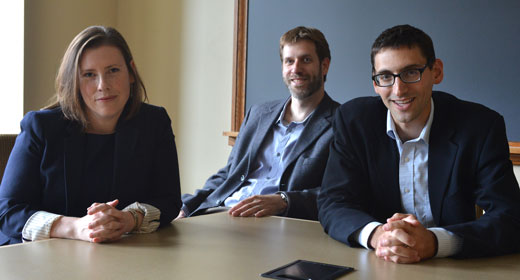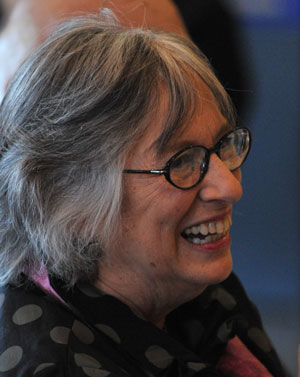
Beth Chimera, David Morse, and Alex Ralph—the Ford School’s writing instructors—chat about the skills they teach, why those skills matter for aspiring public servants, and what they love about the work.
S&H: What kinds of writing projects do students bring in?
Chimera: In a typical workday, I might see eight students back-to-back and one’s writing [a policy memo] about fracking, and one’s writing about mandatory minimum sentencing, and somebody else is writing about immigration policy.
That’s one of the things that I love most about this job is how mentally agile it keeps me.
S&H: So students are teaching you; what are you teaching them?
Chimera: Part of the job [for students] is trying to figure out, ‘What does the reader already know? What would this person be interested in knowing? Who is this person delivering these talking points to? And what kinds of resistance do they need to anticipate?’
Ralph: Students spend two weeks researching a topic, and they know a lot more than they can fit on the page. Considering their audience also helps them figure out what to keep in, and what to take out.
S&H: Is there room for opinion?
Ralph: Students are often embodying a role. You have no idea what they actually feel in their hearts about the issue, but they’re doing the strategery behind it. It’s a difficult little dance. You’re trying to convince the reader that you’ve thought carefully about all sides of the issue and can be trusted for the validity and accuracy of your analysis. On the other hand, you’re putting forward an argument that is yours.
S&H: What happens when you come across arguments you don’t support?
Ralph: We’re not in the missionary business...so as long as nobody comes in saying that they believe the Third Reich is the wave of the future, I’m probably okay.
Chimera: Also, I notice that some students take a point of view they don’t personally espouse. I think that can be so useful, because it strips away all of the unexamined assumptions.
S&H: I’m sure you love all of your students equally, but really, who are your favorites?
Morse:I have a special thing about working with our military students. They bring into their work a real awareness of why it’s important, and a respect for the institution and the enterprise....
Plus, because they’ve been taught to respect authority, they also give me a lot of respect, but I’m happy to pretend that I deserve it.
Chimera:You just like that they call you “sir.”
Morse: Yeah, they do. I love that.
S&H: What other types of writing do you see?
Group: There are presidential stump speeches, campaign ads, videos, PowerPoint presentations.... For Alan [Deardorff]’s class, students come in with papers that are almost all graphs.
S&H: Do you find that crippling at all?
Morse: I tell students that I’m happy to look at it, to lend my observations, but I always say up front, I’m not sure how much I’m going to be able to help you with the economic analysis here.
Ralph: I say, actually, that I have a lot to offer [laughter]. I quibble with their formulas....
S&H: And you help with the Ford School’s annual skits.

Morse: When I first started at Ford, I wasn’t a lot of help to Elena [Delbanco], who had been contributing to the faculty skit for years. But over the years I got to know people and fortunately, everyone has something that can be made fun of.
We try to make fun of the administration, and there’s sound political theory behind that. The ancient Greeks figured this out. It was the mark of a strong political institution that the leaders could be ridiculed with impunity.
S&H: Sounds like fun.
Morse: In the end, the funnest [S&H: yes, he actually said that] thing about this job is that in the classroom and when students come in individually for 30 minutes or an hour my job is to think with them, and to think as hard as I can and as carefully as I can. We are teaching writing, but ultimately, writing is slow thought.
Below is a formatted version of this article from State & Hill, the magazine of the Ford School. View the entire Spring 2016 State & Hill here.